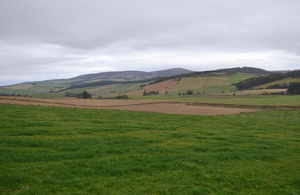Carmichael welcomes UK-won gains for Scottish farmers
UK Common Agricultural Policy allocations agreed

Farmland in Aberdeenshire
As part of the United Kingdom, Scotland has got a better deal on CAP than we otherwise would.
That was the message from Scottish Secretary Alistair Carmichael as the UK’s internal CAP allocations were revealed today. In particular, Mr Carmichael highlighted a written offer from DEFRA Secretary of State Owen Paterson to the Scottish Government aimed at allowing Scotland’s farmers to go beyond the 8% limit on coupled payments by sharing part of the unused flexibility from other parts of the United Kingdom. This option would not be open to a separate Scottish state.
The main points of today’s announcement in relation to Scotland are:
- The existing share of direct payments (pillar 1) will be retained – all four nations will take a nominal cut of 1.6 per cent in allocations as the overall budget has been reduced: Scottish farmers will therefore retain the highest per farmer payment in the United Kingdom.
- For Pillar 2, Scotland will see a 7.8% increase over 2014-2020.
- Within the allocation for Scotland announced today, the UK Government is prepared to offer the Scottish Government limited access to the UK’s flexibility to make coupled payments – to enable the Scottish Government to better target payments towards active, productive farmers, particularly in the livestock sector, providing that the Scottish Government, as the sole beneficiary, agrees to bear any financial risk.
- A commitment to review the internal allocation of UK CAP funds, in 2017, to help inform the UK’s approach to domestic allocations for the next CAP period, post-2020: this will be enabled by the Scottish Government meeting its commitment to move from historic to area payments
Mr Carmichael said:
This announcement is the latest confirmation that Scottish farmers get a better deal on CAP as part of the United Kingdom.
Of course, times are tight in Brussels as at home and direct payments will go down by 1.6% across all of the UK’s family of nations, just as the reduction in structural funds was shared across the UK to Scotland’s benefit.
But there is good news specific to Scotland here too.
We are willing to offer the Scottish Government the opportunity to provide extra coupled payments of up to 10% in the vitally important livestock sector - rather than its allocated 8%. We could do that by sharing the unused flexibility from other parts of the United Kingdom to support the specific needs of Scottish farmers, provided that the Scottish Government, as the sole beneficiary, agree to take on any financial risk.
That flexibility comes with being part of the UK family. We will be sitting down with the Scottish Government to help them deliver this outcome if that is what they choose to do.
DEFRA has also announced today a mid-term review of the allocation of payments to ensure that they are fair in the next financial window too. Once the Scottish Government fulfils its commitment to move from historic to area-based payments we can get on with that review, providing earlier and greater certainty for our farmers.
I am calling on the Scottish Government to deliver on its word and get cracking so that we can make that review happen.
Of course this is not just about the money. During this round of CAP negotiations, the UK has used its size and influence to deliver a series of specific ‘wins’ for Scotland’s farmers; greater regionalisation of the CAP; ensuring that the national reserve can be used to grant entitlements to new and young farmers; securing the inclusion of heather in the definition of permanent grassland; and an extension to 2016 for the designation of Areas of Natural Constraint that are particularly numerous in Scotland.
I come from a hill farming family and live in Orkney where agriculture is of supreme importance to the local economy, so I know well the challenges that farmers face and the certainty they need. Today, as part of the UK, we are ensuring that certainty. Our farming communities are central to Scottish life and central to our concerns as a government.